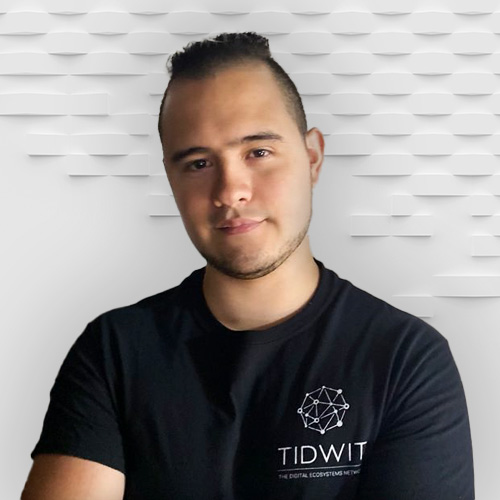Team

Wissam “Will” Yafi

Karim Yafi

Theresia Riesenhuber

Tony Moaikel

Christophe Girault

Mariajosé Gómez

Paul Hengeveld

Erik Wulfers

Andrea Urrego

Mauricio Prada

Juan C. Bedoya

Javier Pardo

Mateo Duque

Federico Montoya

Juan C. García

Miguel Aristizabal

Diego Carmona

Alejandro Sánchez

Camila Duque

Juliana Alvarez

Andrea Rodriguez

JJ Henao

Thea Bitar

Michael Yang

Founder and CEO
Wissam “Will” Yafi
Will brings more than 20 years of international entrepreneurship experience in Information Technology (IT). Will began by founding Intent at the age of 23, a Knowledge Management firm in South America in 1993. By 1999, Will had grown the business to three regional offices. That same year, the firm was acquired by an American B2B firm, which Will joined as VP for Emerging Markets, where he successfully launched a partner program covering the Americas. Will moved on in 2003 to found a partner training consulting business, which formed the basis of TIDWIT. Founded in 2018, TIDWIT’s mission is to provide innovative content and empower learning to organizations all over the world.
His work has taken him to five continents launching learning initiatives and training programs and deploying TIDWIT platforms that are helping establish organizational learning communities worldwide. Will holds a Masters in Public Administration & International Development from Harvard University.

Cofounder, Director, Product & Strategy
Karim Yafi
Karim is responsible for product development and strategy at TIDWIT. He leads a global team that develops new data reporting, learning, and content sharing functionalities and works closely with customers to increase platform usage. He also works on strategies including pricing models, marketing, and fundraising. Karim graduated with honors from Harvard University and an MBA as a Chicago Business Fellow from the University of Chicago Booth. During his free time, he enjoys playing soccer, traveling, and SCUBA diving.

Global Marketing
Theresia Riesenhuber
Based in our EMEA offices in Munich, Germany, Theresia brings more than 20 years of experience servicing large clients, mainly in the high-tech and IT industries. Theresia has successfully managed Microsoft accounts for 15+ years. She currently leads a team that has developed content, online tutorials, presentations, advertisements, localization, training, among other services. Theresia has a Master’s degree in Communications from Ludwig-Maximilians-Universität in Munich, Germany, completed her undergraduate studies at Otto-Friedrich-Universität in Bamberg, Germany, and Universidad Complutense de Madrid, Spain, and holds language degrees from Universität Kassel, Germany, and Instituto Cervantes (Spanish Cultural Institute), Munich, Germany. During her studies she gained extensive experience in various media organizations, among others Deutsche Welle, Westdeutsche Zeitung and Bild Zeitung.
Although one might call her a workadict, she is also passionate about gardening, nature and the environment – working on saving our planet one step at a time.

Cofounder and Chief Technology Officer
Tony Moaikel
Tony brings to TIDWIT over 15 years of experience in high-end mission-critical platform development in the knowledge management and e-commerce areas. Tony’s experience extends from building PC applications all the way to cloud-based applications. Tony began his career at Intent, a knowledge management company, developing process automation and business-critical applications. Later, Tony joined CyBiz, a B2B e-commerce company to develop a B2B e-commerce Internet marketplace application with a workflow engine. Tony’s work at TIDWIT has been instrumental in the development of the robust cloud platform providing high availability and scale. Tony holds a Masters in Computer Science from LU.

Head of Customer Success
Christophe Girault
Christophe leads the Customer Success team at TIDWIT. He is the primary point of contact for TIDWIT enterprise customers. He is passionate about enabling the ecosystems of organizations and helping them achieve success with their desired goals. At TIDWIT, he has helped customers reach and enable more than 200,000 users. Christophe has over 15 years of experience within the IT industry focused on driving Software/SaaS sales globally through strategic partnerships and customer success. He’s worked for well-established PC brands like Packard Bell and NEC, global software leaders like Symantec, and fast-growing startups like AppDirect. Christophe is highly passionate and energetic, thriving on the challenges facing digital transformation, and an effective team leader with strong business acumen. He lives in France with his wife and kids and enjoys windsurfing and skiing in his free time.

Customer Success Analyst
Mariajosé Gómez
Her main focus is ensuring customer satisfaction, promoting growth, and the organization’s success in the market. She works closely with clients to ensure they achieve their goals and obtain maximum value from TIDWIT. Additionally, she collaborates with internal technical support teams to address and resolve any issues or concerns that customers may have in a timely and effective manner. Her proactive and customer-oriented approach enables her to provide quick and efficient solutions.
In her free time, Mariajosé enjoys reading, diving, and spending time with her loved ones (including pets).

Head of Cloud Provider Ecosystems
Paul Hengeveld
Paul serves as Head of Cloud Provider Ecosystems at TIDWIT. He helps enable the ecosystems of Cloud Providers, ISVs, GSIs, and other organizations. Prior to joining TIDWIT, served in senior roles in Microsoft and Salesforce, with his most recent role as Oil & Gas global director for Salesforce. Paul brings over 25 years of experience in the technology sector leading the commercial development of complex global organizations.

Head of Partnership Activities and Business Development
Erik Wulfers
During a career spanning over 30 years, Erik has gained extensive knowledge and expertise in international business development, Indirect Sales, Ecosystem Partnering and Alliance management.
He started his career in the Netherlands in 1984 with Philips Electronics managing indirect sales in several European countries. A switch to ABN Bank brought him to work and live in Dubai, where he joined Oracle and was instrumental in growing the Middle East presence (including launching Oracle Egypt while living in Cairo).
He relocated to Silicon Valley in the 1990’s to manage and expand Oracle indirect sales through distributors and partners in the Middle East, Africa, and Central Asia. Erik has also worked for extended periods at other large technology companies, including Hewlett Packard and Hitachi, where he continued to focus on alliance management, joint solution development and optimizing sales through partners.
Erik was also part of a growing team at WorkSpan, the category creator and leader of Ecosystem Management, responsible for building and executing their initial partnering activities.
Currently he is a member of the TIDWIT team where he heads up the partnership activities and is involved in several other business development activities.
Erik is originally from the Netherlands where he received an MBA in Marketing and Finance from Erasmus University and currently resides in Western North Carolina near Asheville.

Platform Analyst and QA Manager
Andrea Urrego
Maria Andrea is a Platform Analyst and QA Manager at TIDWIT. Maria Andrea studied Informatics Engineering at Politecnico Colombiano Jaime Isaza Cadavid. During her free time, she enjoys baking cakes, traveling with her husband and playing with her 2 dogs.

UX & Design
Mauricio Prada
Mauro is TIDWIT’s graphic and web designer with experience in:
» Web Design
» Digital Marketing
» Email Marketing
» Development
» Branding
» SEO Positioning
» SEM
Mauro is known for his creativity, proactivity, focus on quality, responsibility and professional ethics.

LATAM Sales Director
Juan C. Bedoya
Juan has been an ECM professional with more than 20 years designing and implementing Content and BPM solutions in the Latinamerican Market. He has served medium and large enterprises in industries such us financial, insurance, oil & gas, telcos, energy, and government. Juan is a Computer Engineering graduate from the University of EAFIT.

Full-Stack Software Engineer
Javier Pardo
Javier is a Full-Stack Software Engineer at TIDWIT. He works on developing and integrating the latest applications and features on TIDWIT. He has more than 10 years of experience as a developer and has worked as a developer across various different industries like finance and education. He studied Computer Programming at IUSH and Corporacion Universitaria Adventista. In his free time, he enjoys photography.

Junior Development
Mateo Duque
Hello, I’m a programmer at TIDWIT responsible for creating Apps on the platform. I enjoy the thrill of coding and have been involved in TIDWIT’s ecosystem campaign and am currently focused on ecosystem forms and workflows. In my spare time, I loves riding motorcycles, the freedom of traveling on a bike, and exploring new places as I’m always on the lookout for new adventures. I also adore my pet with all my heart.

Software Engineering
Federico Montoya
Student of Software Engineering at Universidad de Medellín. Haven´t had a proffesional job but worked on university and personal related projects using different languages like Python, Java, Javascript and SQL on different technologies like Android Studio, Postgres and NodeJS. Specially interested in projects involving mathematical and analytical skills.

Content Acquisition
Juan C. García
Juan Carlos has ample experience in customer service and operations management. He specializes in customizing services to meet the customer’s needs. Before joining TIDWIT, he worked for over 20 years in P&G. Juan Carlos holds a bachelor’s degree in Business Administration and Economics from the University of Santo Tomas de Aquino. During his free time, he enjoys playing tennis. He has two daughters and owns 3 dogs.

Business Development Executive
Miguel Aristizabal
Soy Administrador de Negocios de la Universidad EAFIT y me apasiona todo lo relacionado con la tecnología, finanzas y proyectos. Me encanta estar al día con las últimas tendencias y avances en estas áreas y siempre estoy buscando maneras de aplicarlas en mi trabajo. Fuera del trabajo, disfruto pasar tiempo con mi familia y amigos, salir a comer, ver películas y hacer actividades al aire libre.

Quality Assurance & Product Documentation
Diego Carmona
Hi there! I am a Systems Engineer, currently working on Quality Assurance and Product Documentation at TIDWIT. I consider myself a perseverant and investigative person always trying to find the best solution to any obstacle. I am passionate about learning, family, video games, exploring new places and more, much more …

UI/UX Designer
Alejandro Sánchez
I am currently studying the last semester of Digital Entertainment Design Engineering at UPB.
I am passionate about web design, advertising design and application and interface design, I also like digital marketing, music production, audiovisual production, business and soccer.
I consider myself a very perfectionist, persevering and responsible person. I am not afraid to give my opinion and I always look for a way to make my ideas come true.
I have always said that designers have the ability to turn other people’s dreams into reality.

Customer Service
Camila Duque
Camila Duque is a dedicated customer-obsessed specialist based in Medellín, Colombia, bringing her passion for exceptional service to TIDWIT’s high-value customer, Amazon. With a keen eye for innovative solutions and an unwavering commitment to client satisfaction, Camila excels at building trust, driving results, and ensuring seamless collaboration. Her expertise and enthusiasm for delivering the very best experiences make her an invaluable asset both to TIDWIT and to partners like Amazon, solidifying her reputation as a standout professional in the global technology space.

Content Admin
Juliana Alvarez
Juliana is a Content Admin at TIDWIT. She helps connect and pull new content providers and manage the large selection of content on TIDWIT. In her free time, Juliana enjoys meditating, reading, and traveling.

Content and Video Producer
Andrea Rodriguez
Andrea creates information, marketing, and product content and videos for TIDWIT. She Andrea studied Communication and Literature at EAFIT University. In her free time, she enjoys photography and reading.

Customer Support & Content Management
JJ Henao
JJ is a Customer Support and Content Manager at TIDWIT. He works to help serve organizational customers and manage the large selection of content on TIDWIT. He studied engineering at Universidad Pontificia Bolivarianain Colombia. He enjoys racing and traveling in his free time.

Sales and Marketing Intern
Thea Bitar
Thea is a Sales and Marketing intern at TIDWIT. She has been working with various teams at TIDWIT on projects such as website updates, outreach research, social posts, and video creation. Thea is a Business Administration and Communication Studies major at Northeastern University. She enjoys traveling and blogging in her free time.

Data Science Intern
Michael Yang
Michael is a Data Science Intern at TIDWIT and primarily works on developing new applications, analyzing ideas using data-driven approaches, and improving the depth of the reports. Before working at TIDWIT, he was an undergraduate student researcher at the UC Berkeley Neuro-economics Lab, modeling privacy factors and transitivity of preferences. Michael studies Computer Science and Applied Mathematics at the University of California, Berkeley.



